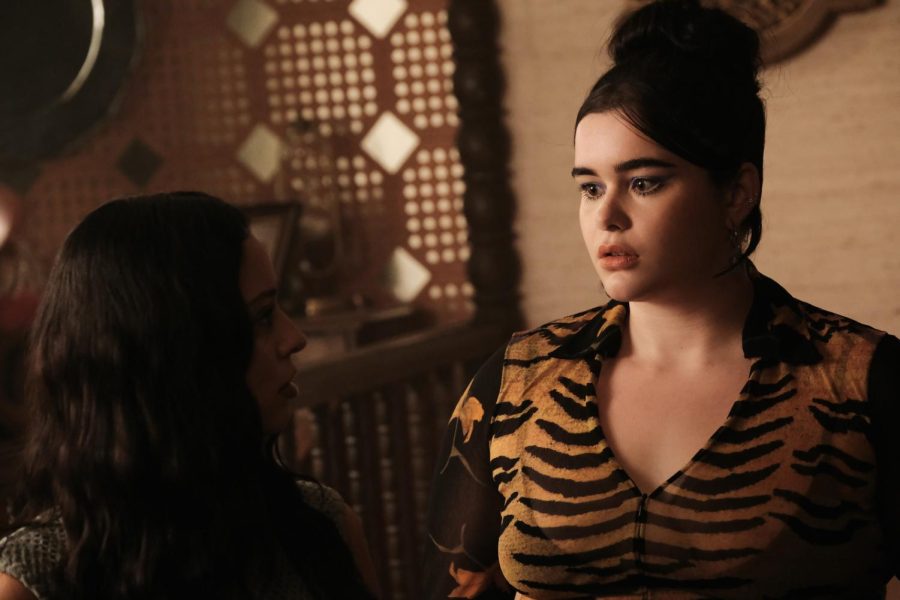Opinion: ‘Euphoria’ is emblematic of the exploitation of teens in media
HBO’s “Euphoria” capitalizes on teenage sexuality under the pretense of empowerment.
Season two, episode six of “Euphoria” premiered on HBO and HBO Max on Feb. 13. New episodes air on Sundays at 9 p.m. (Photo by Eddy Chen/HBO, courtesy of WarnerMedia)
February 17, 2022
Content warning: This article contains descriptions of pedophilia and child pornography.
After premiering over two years ago, “Euphoria” returned early last month with a highly anticipated second season. While the series has garnered significant attention and a loyal fanbase, its explicit sexual content warrants substantial criticism.
There are numerous examples of characters who are minors being exploited in season one of “Euphoria.” One student, Kat Hernandez (Barbie Ferreira), is filmed engaging in sexual acts, and the video is posted online. While efforts are made to condemn this moment by the show’s writer — such as Kat acknowledging the video as child pornography and the school principal vowing to find out who published it — the show ultimately depicts her embracing it by having her become a camgirl.
Kat engaging in underage sex work is participation in her own sexual exploitation — not a reclaiming of her sexuality — as she is a minor and cannot understand the full scope of sexual activity. This is not directly addressed in the series, nor is the trauma and grooming that come with camgirling. Consequently, the show implies that camgirling is simply profitable and sexy instead of informing its audience of the repercussions. This glamorization of underage sex work is detrimental to young viewers as it could lead them down a similarly dangerous path.
Season two of “Euphoria” continues to display gratuitous sexual content. This exposure can cause discomfort and panic for viewers, incite similar high-risk activity or influence a child’s expectations about sex. Considering minors are impressionable, presenting characters in unsafe circumstances favorably could create a positive association, when these experiences should really serve to caution viewers.
It is important to note other shows have sexualized characters who are minors with similarly ineffective criticism. Season one of “Riverdale” featured a relationship between a student and teacher and depicted an explicit sex scene between the two. While the teacher is censured and eventually forced out of town, the series does not unpack the emotional trauma of the underage student. Rather, he defends her at one point by saying he consented to their relationship despite the fact that he is unable to do so as a minor. With student-teacher relationships being a trope in media and occurring in real life, “Riverdale” had the opportunity to explore how unethical and damaging they are. However, the show fails to do so by focusing more on the drama of the relationship — with several scenes of the pair being intimate and other characters gossiping about them — rather than how the student, Archie Andrews, is sexualized, preyed upon and denied justice.
YouTuber Kennie J.D. points out that in instances like these, “minors are being fed their own predation.” These storylines are played off for drama rather than to educate viewers, and the victims never recognize or comprehend their exploitation. This makes it difficult for children watching to understand how detrimental these scenarios are.
Showrunners creating TV shows about minors must be aware of this: If a series centers around the teenage experience, that age group has to be considered as part of its potential audience. “Euphoria” showrunner Sam Levinson claimed he hopes the show “creates a certain dialogue between parents and their kids,” but clarified that he doesn’t think the show is for people under 17. How can these kids be expected to talk about a show that isn’t intended for them?
It is crucial to remember that minors can and do watch this show. And while “Euphoria” does focus on them, its presentation of their exploitation in a voyeuristic manner, without any criticism or consequences, sensationalizes dangerous behavior.
Not only does this set a poor example, but it could also catalyze the real-life sexualization of minors — particularly young girls who are forced to grow up at an increasing rate due to social media. “Euphoria” is being irresponsible in its depiction of teenagers, and cannot continue to put the safety and well-being of minors at risk.
Contact Sunny Sequeira at [email protected].
























































































































































